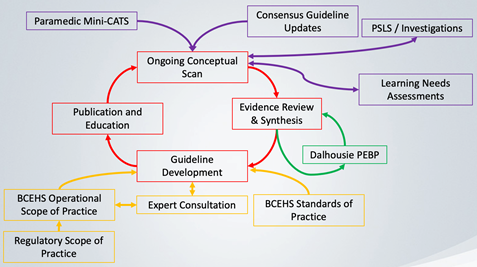Confirmation
Guideline Development and Methodology
The 2021 Clinical Practice Guidelines were developed over a period from the spring of 2019 through the fall of 2020. Paramedics, practice leaders, physicians, and subject matter experts worked together to draft, review, and approve over 120 guidelines on a wide range of topics. The authors of the individual guidelines drew inspiration for their work from a variety of sources, including pre-existing BCEHS practice, experience through the BC Patient Safety Learning System, examples of practices in other jurisdictions, and the most current guidance from various organizations such as the Canadian Cardiovascular Society and Trauma Services BC. The process was open to staff from across the province, and over 40 people ultimately submitted draft guidelines for consideration.
As the guidelines were being written, authors consulted with the Dalhousie Prehospital Evidence Base Project (PEBP) to examine the current state of knowledge with respect to out-of-hospital care. The PEBP is an attempt to make sense of disparate studies across a variety of disciplines that may offer insight into best clinical practices in out-of-hospital care. This project is still in its early stages, but the process of critical appraisal and practice contextualization is not. Results from the PEBP informed the development of the 2021 practice guidelines, and each guideline refers to a specific set of evidence. It is important to note that although the PEBP may strongly support a particular intervention, this does not mean that it will be automatically included in the BCEHS CPGs – incorporation is the result of a considered analysis and takes into consideration many factors, including regulatory scopes of practice, practitioner capacity, cost effectiveness, and educational needs.

Guideline development is an inherently iterative process. As guidelines are developed and implemented, BCEHS learns about the successes and challenges of each document or process; this experience in turn informs how future guidelines are produced or modified. Regular, on-going reviews of the guidelines help ensure they remain up to date and relevant.
The Process of Practice Change
The guideline development process also offers a framework for practice change. By situating new ideas within a practical context, and through the creation of a guideline that reflects the desired development
- Conduct a mini-critically appraised topic: review and synthesize available evidence to produce a recommended practice change.
- Contextualize the evidence in BCEHS practice: draft a practice guideline that outlines how the change should be implemented within BCEHS.
- Submit mini-CAT and proposed guideline to Clinical and Medical Programs for review.
Many practitioners have recommendations for practice changes that run into limitations imposed by the statutory scope of practice. Use of the CPG development framework constructs an argument not only for changes to BCEHS practice, but also the regulatory limits of out-of-hospital practice in British Columbia. The process is slow and sometimes frustrating, but real change is possible – for example, the communication tools advocated for in A03: Clinical Handover and the assessment tools in K02: Sepsis are the direct result of recommendations by individual paramedics who followed this specific process.
Guideline Sustainment and Maintenance
Guidelines begin to age as soon as they are published. To prevent this from happening, BCEHS is forming a working group of interested CPG stakeholders, including representatives from various business units across BCEHS as well as from the training agencies, EMALB, first responder organizations, and other CPG user communities. The working group will be responsible for ensuring the guidelines continue to align with best practices and remain relevant to practitioners in British Columbia.
Working group members will be expected to complete the online Dalhousie Paramedic Evidence Based Practice Course and join the PEBP as an appraiser. Additional training in other evidence-based methodologies, including the use of the AGREE II guideline development and assessment tool, will also be required. Members will be assigned responsibility for particular areas of the CPGs and will perform regular surveys of the literature to identify upcoming trends or potential practice changes. The results of these surveys will be shared with the rest of the working group and considered for incorporation; the group will make recommendations to BCEHS Clinical and Medical Programs, which will retain overall editorial control of the content of the CPGs.
If you are interested in participating in this process, please e-mail handbook@bcehs.ca. A formal process for selecting BCEHS members will be unveiled soon.
We look forward to working with you.